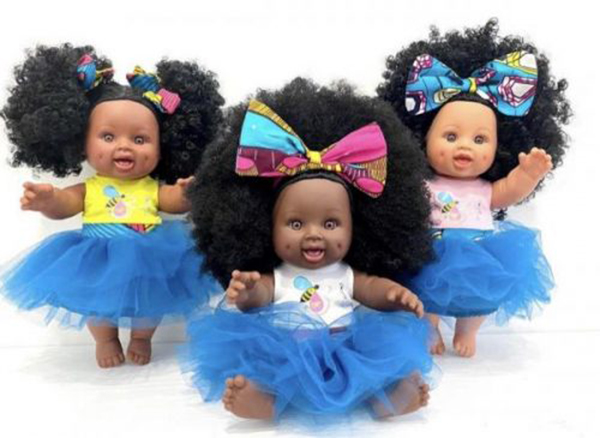In a world that frequently fails to adequately represent and celebrate the beauty and diversity of various ethnicities, it is heartening to see young people who not only embrace their unique identity but also inspire others to do the same. One such story is that of a six-year-old girl who, after losing affection for her blackness at school, became the owner of a black doll company. Her voyage serves as a potent reminder of the significance of self-love, representation, and children’s ability to be change agents.

A Conflict with Identity:
Growing up in a predominantly Caucasian community, Mia Thompson, age six, initially struggled with her identity. She frequently felt like an outsider, especially at school, where the limited representation of Black culture caused her to feel estranged from her origins. The lack of variety in the toys accessible to her exacerbated her feelings of inadequacy and isolation.

A Critical Moment:
However, everything changed for Mia when her parents gave her an ebony doll for her birthday. She saw a reflection of herself in a toy for the first time, which inspired a newfound sense of pride and love for her blackness. Mia began to question why more children didn’t have access to dolls that resembled them after realizing the impact this doll had on her own self-esteem.

The Inception of a Dream:
Mia conveyed to her parents her desire to establish a doll company that catered specifically to children of color, prompted by her own experiences. To their bewilderment, this ambitious young woman not only discussed the concept but also wished to implement it immediately. Mia’s parents offered unwavering support for the realization of her goal, as they were inspired by their daughter’s zeal and entrepreneurial spirit.
Mia’s Black Doll Business:
Mia began her voyage to create a line of dolls that celebrated the diversity of black children with the help of her parents. Mia drew designs for dolls that reflected a variety of skin tones, hair textures, and cultural influences, drawing inspiration from her personal experiences and those of her friends and family.
Mia’s parents helped her connect with local artisans and manufacturers who shared her vision after she refined her designs. They worked tirelessly to bring Mia’s sketches to life, ensuring that each and every detail authentically reflected the beauty of black children.

Contributing to a Positive Difference:
Mia’s Black Doll Company garnered rapid recognition and acclaim, not only in her local community but also on a national scale. The figurines’ accurate portrayal and uplifting message captivated both parents and children. Mia’s figurines served as potent instruments for promoting self-love and acceptance among young girls and boys who previously had difficulty finding toys that resembled them.
Mia’s Impact:
Mia, who founded her own doll enterprise, has become an inspiration for children worldwide. Her story has sparked vital discussions about representation, diversity, and the market’s need for inclusive products. She has also been invited to speak at schools and conferences, where she shares her experiences and advocates for inclusion and self-empowerment with eloquence.

Conclusion:
Mia Thompson’s voyage from hating her blackness in elementary school to owning a black doll company at age six is a testament to the power of self-acceptance and representation. Her narrative illustrates the profound effect that toys can have on a child’s sense of self-worth and identity formation. Age is not a barrier to effecting positive change, as illustrated by Mia’s determination, passion, and unwavering love for her blackness, which serve as an inspiration for all. By honoring her heritage and empowering others, Mia has demonstrated that even the smallest of us can make a substantial difference.

